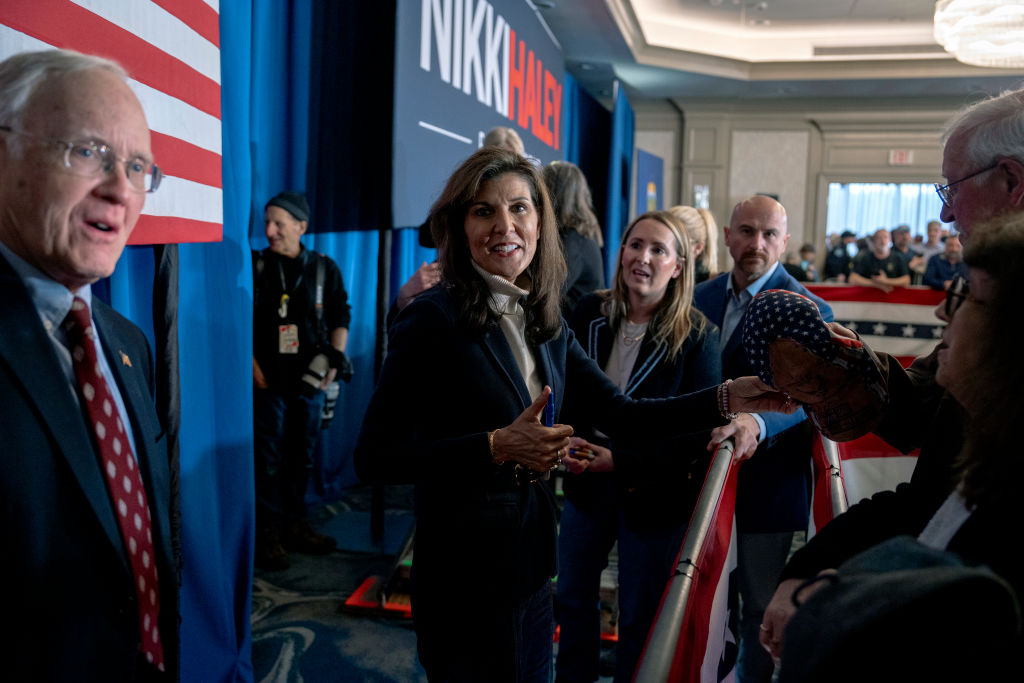Happy Monday! Enjoy this bit of Joe Biden arcana from the recent New Yorker profile of the president: “As early as 1970, a colleague of Biden’s on a Delaware county council observed that he could make a ‘fifteen-minute speech on the underside of a blade of grass.’”
Up to Speed
- Four national polls released this weekend—from the New York Times, the Wall Street Journal, Fox News, and CBS News—show President Joe Biden trailing his likely GOP opponent, Donald Trump, in a head-to-head matchup. The Journal (47 percent for Trump to 45 percent for Biden) and Fox News (49 percent to 47 percent) both found registered voters nationally prefer Trump to Biden by 2 points. CBS News found Trump leading Biden by 4 points with registered voters, and Trump even gets a clear majority: 52 percent to Biden’s 48 percent. The Times, the only one of the four polls to screen for likely voters as well, found Trump’s lead was 4 points and outside the margin of error, 48 percent to 44 percent. Among registered voters, the Times found Trump’s lead was slightly wider at 5 points, 48 percent to 43 percent.
- The crosstabs of the Times poll offer insight into how Trump is currently beating Biden. Among likely voters, the Republican frontrunner is leading the president with men, white voters, and voters without bachelor’s degrees. Trump also wins with Gen X and millennial voters, and he has a narrow lead with women and Hispanic voters. Trump is also winning 20 percent of black voters—a big jump from the 8 percent he won in 2020, according to the Pew Research Center.
- Perhaps most troubling for the president, the Times poll showed just 85 percent of Biden 2020 voters saying they’ll vote for the president again, compared to 9 percent who say they will vote for Trump this time. Meanwhile, 97 percent of Trump 2020 voters say they will vote for Trump again. That number tells a big part of the story of Biden’s poor numbers: he’s lost members of his 2020 coalition. Only one incumbent president in the modern era has ever shrunk his share of the vote (and his overall vote total) and gone on to win reelection: Barack Obama in 2012.
- In an eventful weekend for the GOP primary, Trump scooped up 39 additional delegates from Michigan at that state GOP’s convention Saturday, adding to the 12 he won in the state primary earlier in the week. Also on Saturday, Trump swept the Idaho and Missouri Republican caucuses, netting him an additional 83 delegates total from those states. (Missouri still has three of its delegates to award, and it won’t do so or bind its delegates to a candidate until the state party convention in May.)
- But it wasn’t all wins for Trump this weekend. His remaining opponent, Nikki Haley, scored a victory Sunday in the District of Columbia’s Republican primary—the first time this cycle someone other than Trump has won a primary or caucus. Haley got nearly 63 percent of the vote and snagged all 19 of D.C.’s delegates. The former South Carolina governor became the first woman to win a Republican presidential nominating contest. Trump now has 244 delegates to Haley’s 43 delegates.
- Some dueling statements from the GOP campaigns. First, Haley spokeswoman Olivia Perez-Cubas: “It’s not surprising that Republicans closest to Washington dysfunction are rejecting Donald Trump and all his chaos.” Now, from Trump spokeswoman Karoline Leavitt: “While Nikki has been soundly rejected throughout the rest of America, she was just crowned Queen of the Swamp by the lobbyists and DC insiders that want to protect the failed status quo.”
- On Monday, the Supreme Court issued a unanimous ruling restoring Trump to the primary ballot in Colorado. The unsigned decision, with concurrences from the three liberal justices and a separate concurrence from Amy Coney Barrett, overturns a ruling from Colorado’s Supreme Court that had disqualified Trump under the 14th Amendment’s insurrection clause and removed him from the ballot. The Supreme Court’s decision held that the responsibility for enforcing the relevant section of the 14th Amendment fell to Congress, not the states.
Trump’s Path to the Nomination Runs Through Super Tuesday

Politically speaking, Donald Trump will head into Super Tuesday—the single day of the cycle with the most presidential nominating contests—stronger and more secure than ever.
The Republican frontrunner has vanquished all but one of his major primary opponents. He remains incredibly popular within the Republican party, with 84 percent of self-identified Republican likely voters saying in a recent New York Times poll that they have a “very” or “somewhat” favorable view of him. His numerous legal problems—from the financially draining civil lawsuits to his multiple criminal prosecutions—have enhanced his standing among Republicans and have not affected his general election prospects. Indeed, Trump has consistently led President Joe Biden in nearly every national poll this year, as well as in polls of most of the key swing states.
Now, Trump is at the precipice of one of his biggest primary-season victories since Super Tuesday 2016, when he won 7 out of 10 primaries. No, the former president won’t be able to officially clinch the nomination tomorrow. Even if he were to win all 854 delegates to the Republican National Convention that are up for grabs across the 15 states holding GOP primaries, he’d still be a couple hundred short of the 1,215 necessary to have a majority.
But that’s only a matter of time. The Republican National Committee’s rules dictate that nominating contests from the Iowa caucuses through the Super Tuesday primaries must allocate delegates proportionally, which is how Haley has won 43 delegates despite only winning one primary so far. After Tuesday’s primaries, however, state parties can award delegates on a winner-take-all basis, and nearly every upcoming Republican primary or caucus will.
A total victory for Trump across all 15 Super Tuesday states—Alabama, Alaska, Arkansas, California, Colorado, Maine, Massachusetts, Minnesota, North Carolina, Oklahoma, Tennessee, Texas, Utah, Vermont, and Virginia—would show a resounding statement of support from the GOP base. And while primary polling in nearly every one of these states is scant and unreliable, there’s little doubt the results won’t match the overwhelming preference for Trump over Haley as seen in national polls of primary voters.
Still, there may be some states where Haley could provide Trump with more of a contest.
Over the past few days, she picked up a few key endorsements from moderate Republicans in a handful of Super Tuesday states: Sen. Susan Collins of Maine and Sen. Lisa Murkowski of Alaska. Vermont Gov. Phil Scott, who endorsed Haley in January, even campaigned with her Sunday. Will those endorsements have any bearing on Republican primary voters in those states? What about the open primary in Virginia, with its wealth of politically engaged liberals in the Washington, D.C., suburbs who might be willing to vote against Trump?
But even a better-than-expected showing for Haley on Super Tuesday may only matter for the history books. The end of the line for the last challenger standing is nigh, and Trump looks to continue marching on, once again, to the nomination.
Nikki Haley on the GOP’s Future: Does It Include Her?

Nikki Haley has a warning for a Republican Party on the verge of nominating Donald Trump about the sizable chunk of GOP voters backing her.
“Don’t expect them to automatically vote with the party just because,” she said Friday afternoon in a Dispatch Podcast interview. “If they feel unwanted, if they feel unheard, if they feel like the Republican Party’s not even trying to get them, they either won’t vote—which, I hope they do, we should always vote—or they will find some other person to vote for.”
We spoke with Haley as she brought her underdog bid for the Republican presidential nomination to Washington, D.C., where she addressed voters before flying off to points south, north, and west ahead of this week’s Super Tuesday primaries. (The former South Carolina governor and ex-U.S. ambassador to the United Nations proceeded to win the D.C. GOP primary, her first victory, scooping up all 19 of the capital city’s delegates to the Republican convention in Milwaukee.)
Haley was coy during the 35-minute conversation about how she might handle a Trump nomination.
The former president has ruled her out as a potential running mate, and she has similarly ruled out accepting any such invitation. She has not issued a blanket “no” to a potential third-party run, yet has said she could not run on the No Labels ticket because of the requirement that the vice presidential nominee be a Democrat. However, Haley did tell NBC News Meet The Press host Kristen Welker in a subsequent interview that she no longer feels bound by a pledge to endorse the winner of the GOP primary that she signed with the Republican National Committee last year.
“I have always said that I have serious concerns about Donald Trump; I have even more concerns about Joe Biden,” Haley told Welker. “The RNC pledge—I mean at the time of the debate, we had to take it, to where, would you support the nominee? In order to get on that debate stage, you said yes. The RNC is now not the same RNC; now it’s Trump’s daughter-in-law.”
Haley was rather direct in discussing her disappointment with an evolving Republican Party, one that no longer appears to fit her as it once did, and what that means for the thousands of voters who have been supporting her in caucuses and primaries despite the long odds. As we reported just last week, many of these voters no longer feel welcome in the GOP the way they once did. And even though plenty of them have no interest or intention of voting for President Joe Biden, neither are they sure to support Trump.
“You have a massive amount of people,” Haley told us, “who are saying, ‘We don’t like that Republicans no longer care about how much they’re spending. We don’t like that Republicans don’t want allies. We don’t like that Republicans are okay with deciding if you do like Donald Trump, you’re a Republican, and if you don’t want to be with Donald Trump, you’re a Democrat.’”
“It is my job and my duty to make sure that we fight for these people and that they have a voice and that they know there’s a place they’re not wrong,” Haley added. “Guess what: At the end of the day, you can’t win without everybody.”
You can watch the full interview here.
Notable and Quotable
“No. I think I’ll make what decision I want to make.”
—Nikki Haley, when asked on Meet the Press if she will still honor the RNC pledge to support the eventual Republican nominee, March 3, 2024







Please note that we at The Dispatch hold ourselves, our work, and our commenters to a higher standard than other places on the internet. We welcome comments that foster genuine debate or discussion—including comments critical of us or our work—but responses that include ad hominem attacks on fellow Dispatch members or are intended to stoke fear and anger may be moderated.
With your membership, you only have the ability to comment on The Morning Dispatch articles. Consider upgrading to join the conversation everywhere.